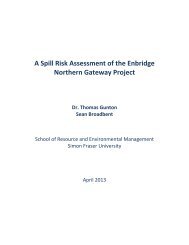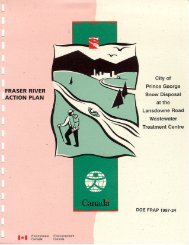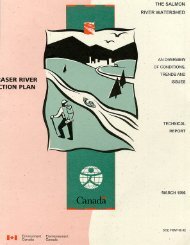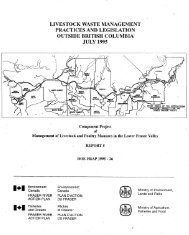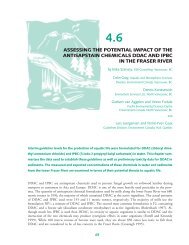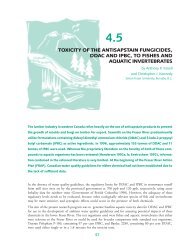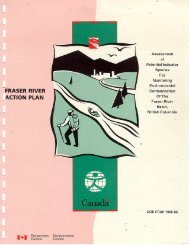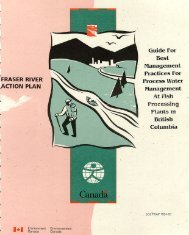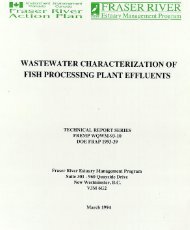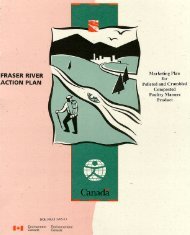Proceedings - Teaching and Learning Centre - Simon Fraser ...
Proceedings - Teaching and Learning Centre - Simon Fraser ...
Proceedings - Teaching and Learning Centre - Simon Fraser ...
Create successful ePaper yourself
Turn your PDF publications into a flip-book with our unique Google optimized e-Paper software.
<strong>Fraser</strong> River Action Plan 3rd Research Workshop<br />
Introduction<br />
Colin Gray - Head, Research Coordination <strong>and</strong> Application Section<br />
Aquatic <strong>and</strong> Atmospheric Sciences Division, Environmental Conservation Branch, Environment Canada<br />
This workshop has been organized by Environment Canada’s <strong>Fraser</strong> River Action Plan (FRAP) research<br />
coordination section. The projects to be presented have been integrated with four other components either jointly<br />
or independently delivered by the Department of Fisheries <strong>and</strong> Oceans (DFO) <strong>and</strong> Department of Environment<br />
(DOE) (Figure 1). While the previous two FRAP workshops have focused on work funded through the<br />
Environmental Quality Technical Work Group, this year the Pollution Abatement Technical Work Group has<br />
also contributed its research information.<br />
The various FRAP projects are organized based on the nature of the issues that they address: those which are<br />
ecosystem oriented, or those which relate to contaminant behaviour or pollutant sources. This workshop features<br />
five presentation <strong>and</strong> discussion sessions which focus on the following areas: (1) pulp mills; (2) transport <strong>and</strong><br />
sedimentation of contaminants; (3) urban runoff; (4) agricultural runoff; (5) biological indicators; <strong>and</strong>, (6)<br />
estuaries.<br />
As FRAP progressively develops, so will the objectives of its workshops. In the beginning, the focus was<br />
primarily on descriptions <strong>and</strong> discussions of both planning issues <strong>and</strong> preliminary results. The present workshop<br />
is significant as it will begin, through a number of summary sessions, the shift from results to the process of<br />
information integration. In the future, two anticipated workshops will have a stronger emphasis on scientific<br />
synthesis in order to generate conclusions on the state of the <strong>Fraser</strong> River. They will also likely address the<br />
issues of enforcement <strong>and</strong> economics (Figure 2), <strong>and</strong> consider what specific management decisions <strong>and</strong><br />
regulatory actions are required to abate <strong>and</strong>/or prevent pollution.<br />
The third FRAP workshop, therefore, has three main goals. First, to measure the progress of each project or<br />
program. Secondly, to begin the integration <strong>and</strong> synthesis of the generated knowledge <strong>and</strong> finally, to plan how<br />
best to organize <strong>and</strong> deliver the information to governments, industries <strong>and</strong> stakeholder groups who have longterm<br />
interests or responsibilities in sustaining the aquatic ecosystem of the <strong>Fraser</strong> River.<br />
Page xix



